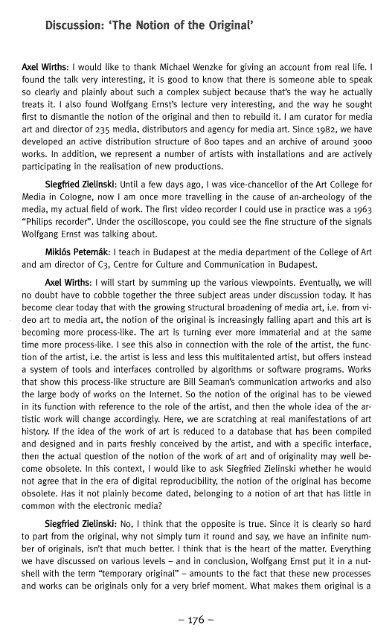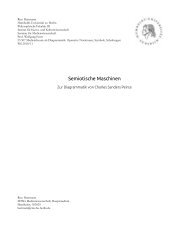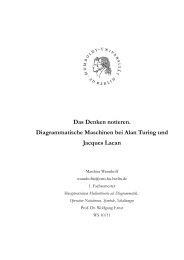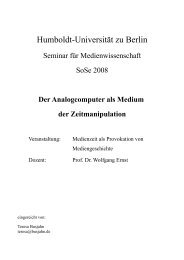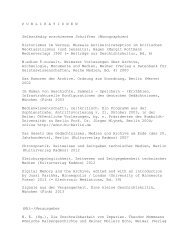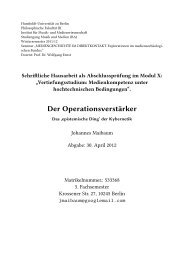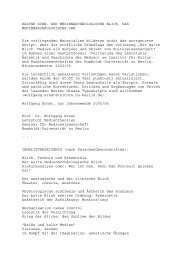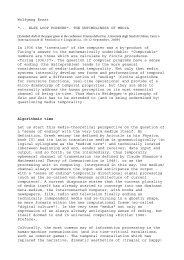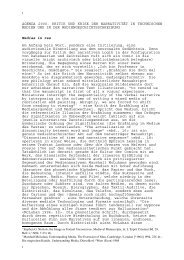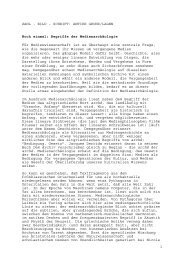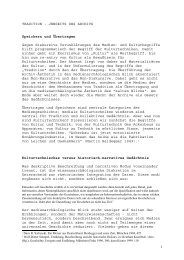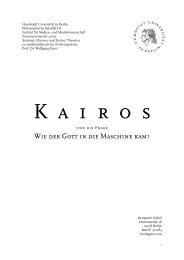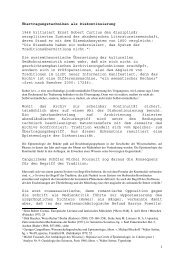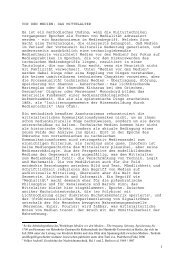Download - Medienwissenschaft
Download - Medienwissenschaft
Download - Medienwissenschaft
Create successful ePaper yourself
Turn your PDF publications into a flip-book with our unique Google optimized e-Paper software.
Discussions The Notion of the Originär<br />
Axel Wirths: I would like to thank Michael Wenzke for giving an account from real life. I<br />
found the talk very interesting, it is good to know that there is someone able to speak<br />
so clearly and plainly about such a complex subject because that's the way he actually<br />
treats it. I also found Wolfgang Ernst's lecture very interesting, and the way he sought<br />
first to dismantle the notion of the original and then to rebuild it. I am curator for media<br />
art and director of 235 media, distributors and agency for media art. Since 1982, we have<br />
developed an active distribution structure of 800 tapes and an archive of around 3000<br />
works. In addition, we represent a number of artists with installations and are actively<br />
participating in the realisation of new productions.<br />
Siegfried Zielinski: Until a few days ago, I was vice-chancellor of the Art College for<br />
Media in Cologne, now I am once more travelling in the cause of an-archeology of the<br />
media, my actual field of work. The first video recorder I could use in practice was a 1963<br />
"Philips recorder". Under the oscilloscope, you could see the fine structure of the signals<br />
Wolfgang Ernst was talking about.<br />
Miklos Peternäk: I teach in Budapest at the media department of the College of Art<br />
and am director of C3, Centre for Culture and Communication in Budapest.<br />
Axel Wirths: I will start by summing up the various viewpoints. Eventually, we will<br />
no doubt have to cobble together the three subject areas under discussion today. It has<br />
become clear today that with the growing structural broadening of media art, i.e. from video<br />
art to media art, the notion of the original is increasingly falling apart and this art is<br />
becoming more process-like. The art is turning ever more immaterial and at the same<br />
time more process-like. I see this also in connection with the role of the artist, the function<br />
of the artist, i.e. the artist is less and less this multitalented artist, but offers instead<br />
a system of tools and interfaces controlled by algorithms or software programs. Works<br />
that show this process-like structure are Bill Seaman's communication artworks and also<br />
the large body of works on the Internet. So the notion of the original has to be viewed<br />
in its function with reference to the role of the artist, and then the whole idea of the artistic<br />
work will change accordingly. Here, we are scratching at real manifestations of art<br />
history. If the idea of the work of art is reduced to a database that has been compiled<br />
and designed and in parts freshly conceived by the artist, and with a specific interface,<br />
then the actual question of the notion of the work of art and of originality may well become<br />
obsolete. In this context, I would like to ask Siegfried Zielinski whether he would<br />
not agree that in the era of digital reproducibility, the notion of the original has become<br />
obsolete. Has it not plainly become dated, belonging to a notion of art that has little in<br />
common with the electronic media?<br />
Siegfried Zielinski: No, I think that the opposite is true. Since it is clearly so hard<br />
to part from the original, why not simply turn it round and say, we have an infinite number<br />
of originals, isn't that much better. I think that is the heart of the matter. Everything<br />
we have discussed on various levels - and in conclusion, Wolfgang Ernst put it in a nutshell<br />
with the term "temporary original" - amounts to the fact that these new processes<br />
and works can be originals only for a very brief moment. What makes them original is a<br />
- 176 -


